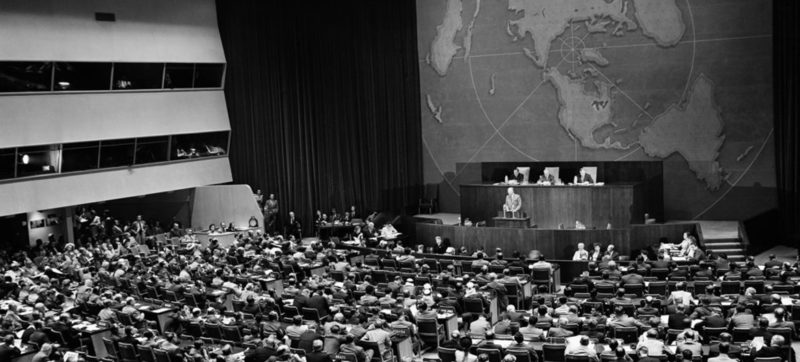Corruption from the Start
The 1947 Partition Plan was going to be rejected
1/20/20252 min read


In 1947, corruption and coercion were used to pressure UN member states into voting for the creation of Israel, and many countries complained about being threatened and pressured into supporting the Zionist cause..
In February 1947, Britain announced its intention to terminate its Mandate, handing the future of Palestine to the 57 member states of the 14 month-old United Nations. The resolution handing 56% of Palestine to the minority Jews was not popular and on the day of the vote, indications were that they did not have the required 2/3 majority.
Massive US pressure managed to get the vote delayed for 3 days while the Zionists went into overdrive. A telegram signed by 26 US Senators with influence on foreign aid bills was sent to wavering countries, seeking their support for the partition plan. Liberia and Nicaragua both reported being threatened with economic sanctions.
• United States (Voted: For): President Truman later noted, "I do not think I ever had as much pressure and propaganda aimed at the White House as I had in this instance. The persistence of a few of the extreme Zionist leaders actuated by political motives and engaging in political threats, disturbed and annoyed me."
• Great Britain (Abstained): PM Clement Atlee's initial support for Zionism had dried up mainly due to the terrorist attacks of the Irgun and Lehi over the previous years (Including a letter-bomb campaign against British cabinet members).
• India (Voted: Against): Indian PM Jawaharlal Nehru spoke angrily about the way the UN vote had been set up. He said the Zionists had tried to bribe India with millions and at the same time his sister, the Indian ambassador to the UN, had received daily warnings that her life was in danger unless "she voted right".
• Liberia (Voted: For): Liberia's Ambassador to the United States complained that the US delegation threatened aid cuts and sanctions.
• Philippines (Voted: For): In the days before the vote, the Philippines representative Carlos Romulo had stated that he and his country would not be supporting the vote. During the 3-day delay, the representative was recalled and the Philippines' vote changed.
• Haiti (Voted: For): After an initial stance opposing the partition, Haiti was offered a generous $5M loan and changed their position.
• France (Voted: For): France's delegate to the United Nations claimed that US representatives had implied to him that French failure to support the resolution would block American aid to France, badly needed for reconstruction after the war.
• Cuba (Voted: Against): The Cuban delegation stated they would vote against partition "in spite of pressure being brought to bear against us" because they could not be party to coercing the majority in Palestine.
• Siam (Thailand): After speaking out against the partition on 25th November, the credentials of the Siamese delegations were cancelled altogether.
By 29 November 1947, the Zionists had secured their majority and the General Assembly voted in favour of the modified Partition Plan.
Unitary Palestine Fails in Committee
New York Times
The Israel Lobby and US Foreign Policy (2007)
by John Mearscheimer & Steven Walt
Truman & Israel
by Michael J Cohen
The whole affair was summed up by the Lebanese representative, Charles Malik, who highlighted his frustration with the behind-the-scenes pressure tactics that he believed undermined the integrity of the UN's decision-making process.
"My friends, think of these democratic methods, of the freedom in voting which is sacred to each of our delegations. If we were to abandon this for the tyrannical system of tackling each delegation in hotel rooms, in bed, in corridors and ante-rooms, to threaten them with economic sanctions or to bribe them with promises in order to compel them to vote one way or another, think of what our organisation would become in the future."


